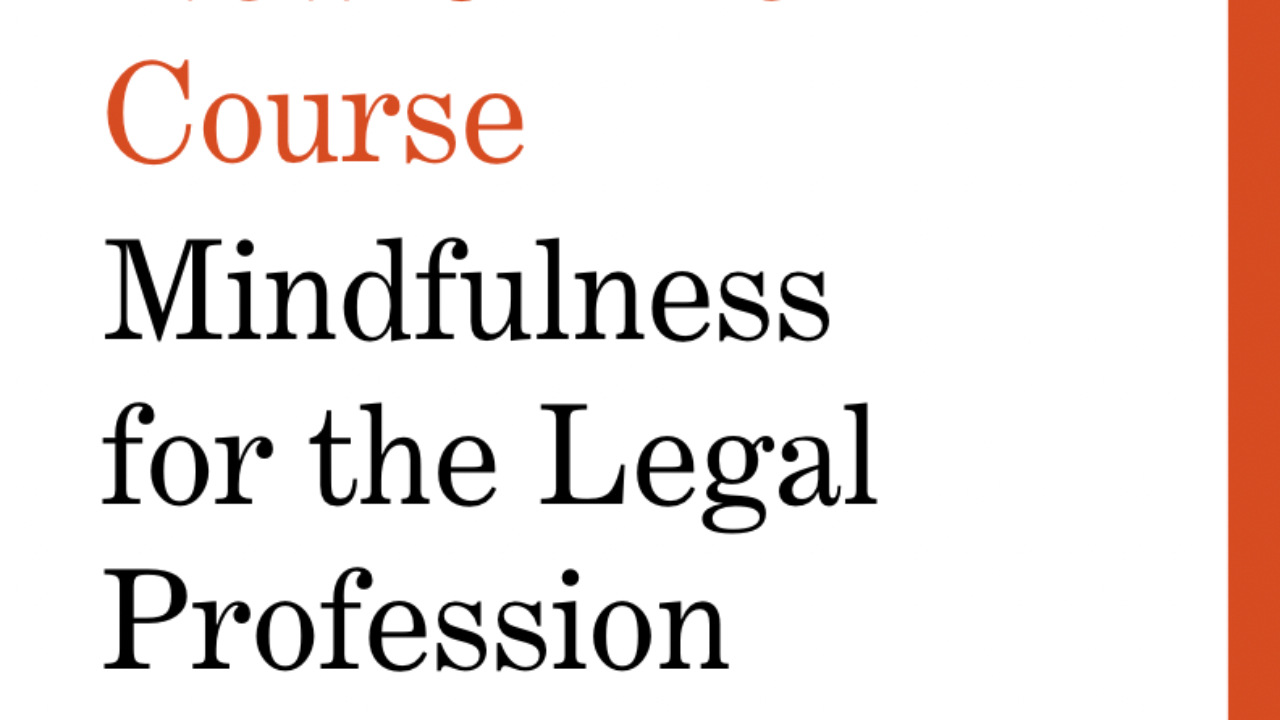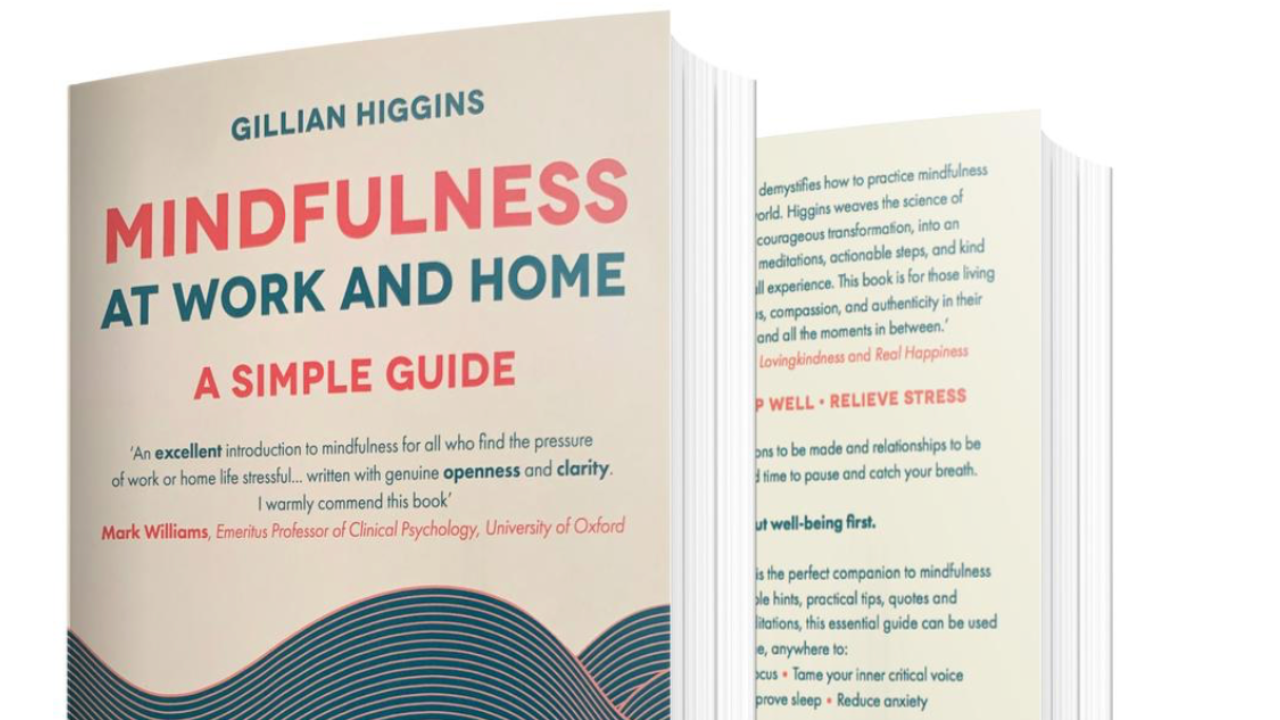Mindfulness News
Read about the benefits of mindfulness in everyday life. Find out more about our courses and latest news.
New Online Mindfulness for the Legal Profession Course in April

So it's been a while...
In the last 18 months, alongside my practice at the Bar, I have been teaching several online mindfulness courses and leading mindfulness retreats for The Daisy Garland, a national charity which works exclusively for children with drug-resistant epilepsy and their families.
In April, I'm excited to be launching a new 4-week online course for the legal profession. In the course, I'll be sharing with you how to practise mindfulness, discussing its many benefits, and exploring how it can enhance your professional life as a lawyer. There's a different theme each week with post-session emails containing further reading and suggested practice.
If you would like more information about the course,click here.
If you would like to reserve a spot, please email me at everydaymindfulness@gillianhiggins.co.uk or register here.
E-Book Mindfulness at Work and Home

It's been 6 years since Mindfulness at Work and Home was published and I'm pleased to say that it's still going strong.
If you fancy owning a portable copy, here's a link to the E-Book so you can ensure that your mindfulness is always close at hand.
https://lnkd.in/e5CgkK4x
Mindful Monday Meditation

Join me for the first in a new series of 30-minute mindfulness meditation sessions on Mondays from 7.30-8pm GMT, live on Zoom.
Each session consists of an introduction to mindfulness, a guided meditation and suggested post-session links for you to further your practice. It's a great way to start your week and build your mindfulness practice.
Everyone welcome. No previous experience is necessary.
£15 inc taxes.
Click here to go to the ticket page and reserve your space.
Hope to see you there!
*There are a number of free spaces are offered to those facing financial constraints/trainees/pupils/students. Simply email Gill at everydaymindfulness@gillianhiggins.co.uk
Must be 18 or over.
Mindfulness in the Workplace Resource Collection
 For those of you interested in learning how to practise mindfulness and introduce it into your workplace, you can now take a peek at the Resource Collection at Everyday Mindfulness.
For those of you interested in learning how to practise mindfulness and introduce it into your workplace, you can now take a peek at the Resource Collection at Everyday Mindfulness.
The Collection hosts post-session emails and further reading links to help you maintain your practice beyond the 4-week online course. It also links to a selection of Daily Mindfulness Practices.
To access the Collection, click here.
Just get in touch if you want to find out more about this season's courses or click here.
More Mindfulness With The Daisy Garland
The Daisy Garland 'More Mindfulness' course shares meditations, daily mindfulness practices, hints and tips on how to bring mindfulness into your daily life.
Tonight's session focuses on stress and how present moment awareness, a key feature of mindfulness, increases our stress resilience.
To find out more about mindfulness and The Daisy Garland, click here

Mindfulness Resource Centre
 This month, I'm launching a space which is dedicated to short Daily Mindfulness Practices which you can do at home or at work. To take a look at the first five practices, simply click here.
This month, I'm launching a space which is dedicated to short Daily Mindfulness Practices which you can do at home or at work. To take a look at the first five practices, simply click here.
Deep Rest Ten

Taking ten minutes out for yourself during the day to step out of automatic pilot mode can be a life-saver. Choose a quiet place, listen to a guided meditation track and prioritise this time for yourself. You may be surprised at how rested you feel.
Wellbeing at the Bar 2024
 The Wellbeing at the Bar report published in February 2024 (based on data from 2023) showed some improvements since the last report in 2021. However, worryingly and significantly, 34.9% of responders indicated they tended to feel down or in low spirits and of these, 23.7% reported low psychological wellbeing, while a third (31.4%) indicated they weren’t coping. Significantly, women, barristers from an ethnic minority background, and those who are younger and more junior had lower overall wellbeing. While barristers working in family law had significantly lower overall wellbeing compared to all other practice areas, except for the Criminal Bar.
The Wellbeing at the Bar report published in February 2024 (based on data from 2023) showed some improvements since the last report in 2021. However, worryingly and significantly, 34.9% of responders indicated they tended to feel down or in low spirits and of these, 23.7% reported low psychological wellbeing, while a third (31.4%) indicated they weren’t coping. Significantly, women, barristers from an ethnic minority background, and those who are younger and more junior had lower overall wellbeing. While barristers working in family law had significantly lower overall wellbeing compared to all other practice areas, except for the Criminal Bar.
The key findings include the following:
- Overall, barristers reported higher levels of work satisfaction and wellbeing in 2023 when compared to 2021. This was in terms of their psychological wellbeing, workload management and supportive work environment.
- 73% of respondents agreed they had supportive colleagues and/or work environment, a rise ...
Stress and Resilience in the US Judiciary
 A comprehensive report released in the 2020 Journal of The Professional Lawyer which surveyed more than 1,000 judges across the United States suggests job stress has become a serious health concern in the state judicial ranks, with about one-third or more reporting fatigue and low energy, sleep disturbance or disturbed attention and concentration. The survey was carried out before the pandemic.
A comprehensive report released in the 2020 Journal of The Professional Lawyer which surveyed more than 1,000 judges across the United States suggests job stress has become a serious health concern in the state judicial ranks, with about one-third or more reporting fatigue and low energy, sleep disturbance or disturbed attention and concentration. The survey was carried out before the pandemic.
Interestingly, for stress relief, mindfulness was endorsed as a current activity by 36% of responders, although 81% of the judges were interested in it. The report concluded that this "suggests that the 45% gap may reflect a potential for further training in this highly effective resiliency skill."
To read the full report, click here.

Mindfulness in the Workplace is a 4-week course which will teach you how to practise mindfulness.
In the live online sessions, you will learn about some of the benefits a sustained practice can bring including improving your focus and attention, managing stress and anxiety and taming the inner critical voice.
The course is delivered in weekly 1-hour Zoom sessions by me, Gill Higgins. Each week there are session notes and links to help you develop your practice.
And most importantly....no previous experience is required.
The first course covers the following themes:
Week 1: What is mindfulness? What are the benefits and how do I practise?
Week 2: Managing stress and increasing the ability to f...